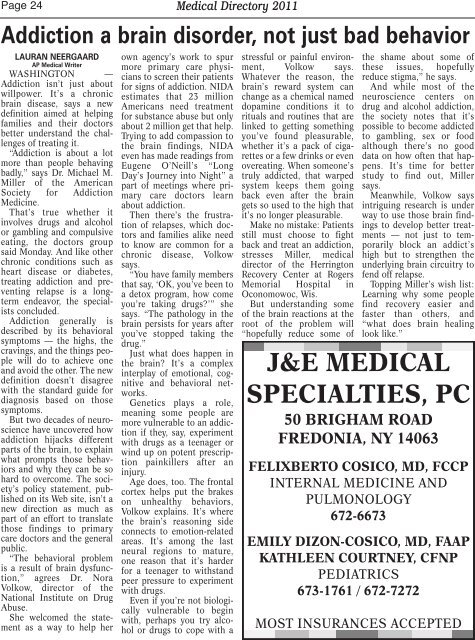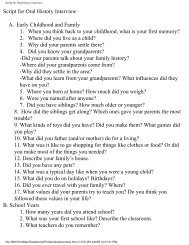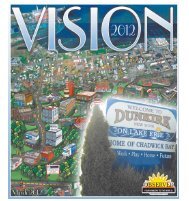Brooks Memorial Hospital - The Observer
Brooks Memorial Hospital - The Observer
Brooks Memorial Hospital - The Observer
- No tags were found...
Create successful ePaper yourself
Turn your PDF publications into a flip-book with our unique Google optimized e-Paper software.
Page 24 Medical Directory 2011Addiction a brain disorder, not just bad behaviorLAURAN NEERGAARDAP Medical WriterWASHINGTON —Addiction isn’t just aboutwillpower. It’s a chronicbrain disease, says a newdefinition aimed at helpingfamilies and their doctorsbetter understand the challengesof treating it.“Addiction is about a lotmore than people behavingbadly,” says Dr. Michael M.Miller of the AmericanSociety for AddictionMedicine.That’s true whether itinvolves drugs and alcoholor gambling and compulsiveeating, the doctors groupsaid Monday. And like otherchronic conditions such asheart disease or diabetes,treating addiction and preventingrelapse is a longtermendeavor, the specialistsconcluded.Addiction generally isdescribed by its behavioralsymptoms — the highs, thecravings, and the things peoplewill do to achieve oneand avoid the other. <strong>The</strong> newdefinition doesn’t disagreewith the standard guide fordiagnosis based on thosesymptoms.But two decades of neurosciencehave uncovered howaddiction hijacks differentparts of the brain, to explainwhat prompts those behaviorsand why they can be sohard to overcome. <strong>The</strong> society’spolicy statement, publishedon its Web site, isn’t anew direction as much aspart of an effort to translatethose findings to primarycare doctors and the generalpublic.“<strong>The</strong> behavioral problemis a result of brain dysfunction,”agrees Dr. NoraVolkow, director of theNational Institute on DrugAbuse.She welcomed the statementas a way to help herown agency’s work to spurmore primary care physiciansto screen their patientsfor signs of addiction. NIDAestimates that 23 millionAmericans need treatmentfor substance abuse but onlyabout 2 million get that help.Trying to add compassion tothe brain findings, NIDAeven has made readings fromEugene O’Neill’s “LongDay’s Journey into Night” apart of meetings where primarycare doctors learnabout addiction.<strong>The</strong>n there’s the frustrationof relapses, which doctorsand families alike needto know are common for achronic disease, Volkowsays.“You have family membersthat say, ‘OK, you’ve been toa detox program, how comeyou’re taking drugs?’” shesays. “<strong>The</strong> pathology in thebrain persists for years afteryou’ve stopped taking thedrug.”Just what does happen inthe brain? It’s a complexinterplay of emotional, cognitiveand behavioral networks.Genetics plays a role,meaning some people aremore vulnerable to an addictionif they, say, experimentwith drugs as a teenager orwind up on potent prescriptionpainkillers after aninjury.Age does, too. <strong>The</strong> frontalcortex helps put the brakeson unhealthy behaviors,Volkow explains. It’s wherethe brain’s reasoning sideconnects to emotion-relatedareas. It’s among the lastneural regions to mature,one reason that it’s harderfor a teenager to withstandpeer pressure to experimentwith drugs.Even if you’re not biologicallyvulnerable to beginwith, perhaps you try alcoholor drugs to cope with astressful or painful environment,Volkow says.Whatever the reason, thebrain’s reward system canchange as a chemical nameddopamine conditions it torituals and routines that arelinked to getting somethingyou’ve found pleasurable,whether it’s a pack of cigarettesor a few drinks or evenovereating. When someone’struly addicted, that warpedsystem keeps them goingback even after the braingets so used to the high thatit’s no longer pleasurable.Make no mistake: Patientsstill must choose to fightback and treat an addiction,stresses Miller, medicaldirector of the HerringtonRecovery Center at Rogers<strong>Memorial</strong> <strong>Hospital</strong> inOconomowoc, Wis.But understanding someof the brain reactions at theroot of the problem will“hopefully reduce some ofthe shame about some ofthese issues, hopefullyreduce stigma,” he says.And while most of theneuroscience centers ondrug and alcohol addiction,the society notes that it’spossible to become addictedto gambling, sex or foodalthough there’s no gooddata on how often that happens.It’s time for betterstudy to find out, Millersays.Meanwhile, Volkow saysintriguing research is underway to use those brain findingsto develop better treatments— not just to temporarilyblock an addict’shigh but to strengthen theunderlying brain circuitry tofend off relapse.Topping Miller’s wish list:Learning why some peoplefind recovery easier andfaster than others, and“what does brain healinglook like.”J&E MEDICALSPECIALTIES, PC50 BRIGHAM ROADFREDONIA, NY 14063FELIXBERTO COSICO, MD, FCCPINTERNAL MEDICINE ANDPULMONOLOGY672-6673EMILY DIZON-COSICO, MD, FAAPKATHLEEN COURTNEY, CFNPPEDIATRICS673-1761 / 672-7272MOST INSURANCES ACCEPTED













